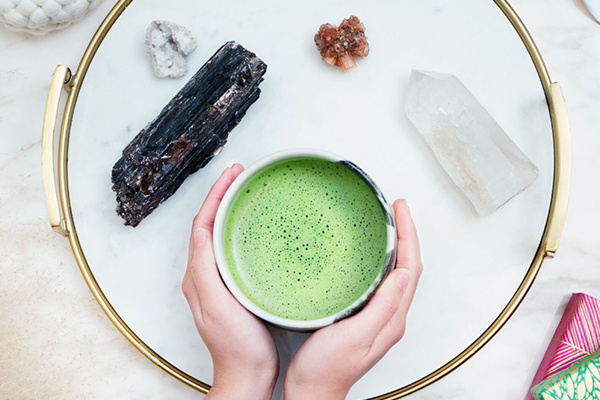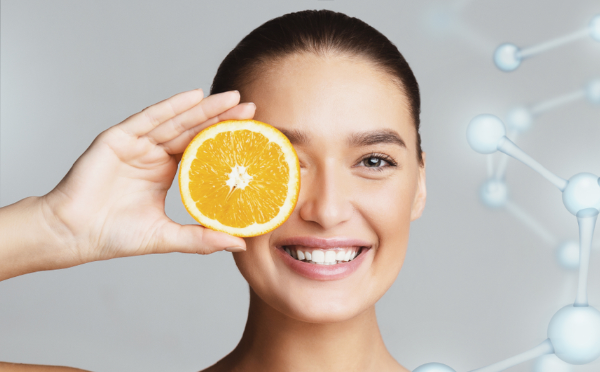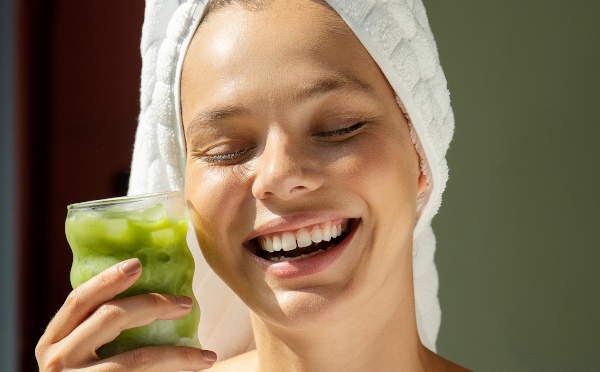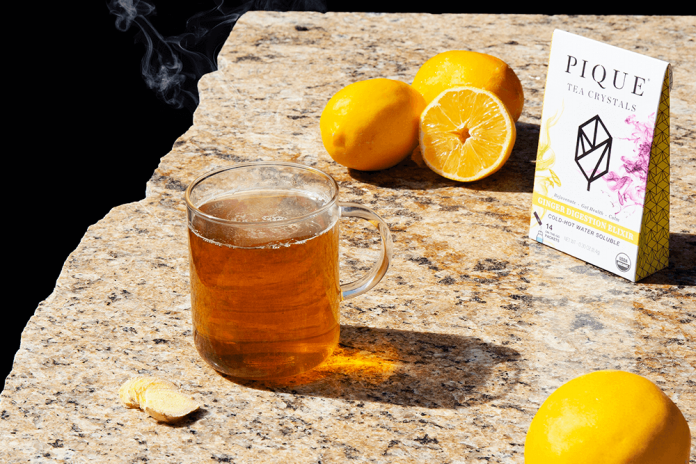More than just a source of caffeine, tea is full of healthy plant compounds – many of which also happen to possess mildly mind-altering properties.
For instance, tea contains calming l-theanine, and some research suggests the polyphenol antioxidants in tea, like EGCG, may also affect our mental states. (1)
That’s probably why legend, history, and modern science all support the idea that drinking tea prior to meditation is a potent and beneficial practice.
Whether you’ve been a dedicated practitioner for years or only recently became interested in meditation for the research-backed benefits, tea drinking can enhance and deepen your experience.
For that matter, you can also enjoy your tea during a simple, easy form of mindfulness meditation!
Keep reading to discover the ins and outs of this ancient, revered combination, and learn how you can apply it to your daily life for greater peace and focus.
The history of tea and meditation
A famous legend about the origin of tea features Bodhidharma, a 6th-century Indian monk who wandered China.
Bodhidharma had a reputation as a maverick and something of an unpredictable character, but he was fully dedicated to meditation (and to spreading the practice far and wide).
According to the legend, Bodhidharma once meditated for seven straight years facing a cave wall. Then he fell asleep for two years.
Upon waking in the ninth year, he became frustrated at his loss of awareness, then removed his eyelids and tossed them to the earth so he’d never again fall asleep during practice!
Afterward, the eyelids remained on the soil. But they soon turned into the first tea plants, and other monks began to brew the tea leaves.
From then on, thanks to the stimulating effects of tea, sleepiness during meditation was no longer a problem.
Bodhidharma was a real person, and he’s traditionally regarded as the first Chinese patriarch of Zen (Ch’an) Buddhism. Did he really meditate alone in a cave for 9 years? No one can say for sure, but it’s possible.
Of course, we can say that tea most likely didn’t originate from a monk’s eyelids. Nonetheless, the story contains plenty of truth.
Historians think that Zen monks actually did spread the Camellia sinensis plant across China, and later to Japan and beyond, while they promoted Buddhism and meditation.
And as the story of Bodhidharma’s eyelids alludes to, meditation and tea are truly complementary–for multiple reasons.
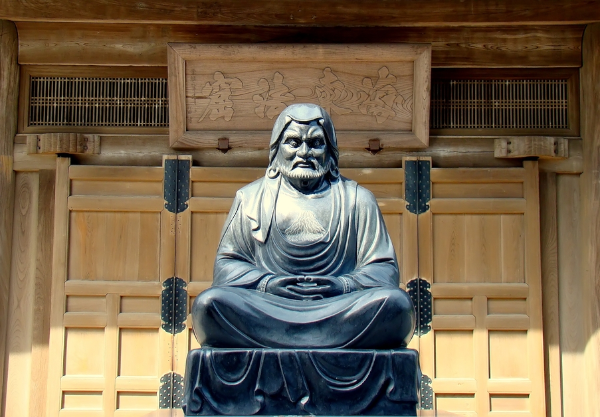
What happens when you drink tea and meditate?
From looking at the research on how beneficial compounds in tea affect the brain, we can see how the practice of tea drinking gently encourages desirable mental qualities during meditation.
Caffeine reduces sleepiness during meditation
If you’ve tried meditation, you’re probably aware that sleepiness can be an issue. Relaxing and “letting go” sometimes leads to extraordinary states of bliss, but other times causes us to drift off into an accidental nap.
However, if you drink a cup of tea at least 30 minutes before meditation, you’re less likely to spend your session fighting off the urge to sleep. (2)
A cup of tea contains around 40 to 100 milligrams of caffeine depending on the variety and how it’s prepared. (3)(4) In other words, just the right caffeine dose to deal with sleepiness without making you feel restless.
Additionally, the caffeine in tea feels different from coffee – smoother, less harsh, and less jittery.
While there are other techniques for working with sleepiness (depending on your meditation method of choice), judging from the fact that monks have used green tea for nearly two millennia to stay alert during meditation, it’s an effective and proven solution.
L-theanine supports calm relaxation
Even if you don’t struggle to stay awake while practicing meditation, there are still other reasons tea can be an excellent ally for mindfulness purposes.
L-theanine, the calming amino acid in ground tea, supports alpha brain wave activity. (5) Alpha brain waves, as measured on an electroencephalogram (EEG), are brain waves between 8-14 cycles per second that correlate with a state of “calm focus.”
But guess what else generates alpha brain waves, similar to l-theanine?
If you guessed meditation, you’re correct! (5)
And perhaps not coincidentally, shade-grown matcha, the tea variety highest in l-theanine, is a long-time favorite tea of Buddhist monks.
EGCG might support blissful states
Tea catechins like EGCG may also have calming, mood-boosting psychoactive effects through the CB1 and CB2 receptors. (1)
The CB receptors are part of your endocannabinoid system, and they’re typically activated during activities like exercise, yoga, meditation, and deep breathing. (6)
How to use tea to enhance your meditation practice
Using tea for meditation benefits is easy.
The most important aspect is timing: be sure to drink tea 30 minutes or more in advance, to give the caffeine time to work. (2) Other beneficial compounds in tea likely absorb at a similar rate.
Then, meditate as usual. However, if you require more than 1-2 cups of tea to stay awake while meditating, you may need to work on getting better sleep.
Alternatively, if you’re still feeling sleepy or unfocused during meditation after drinking tea in a well-rested state, you might be dealing with a phenomenon known as “subtle dullness.”
Subtle dullness is a type of distraction or spacing out that can make you sleepy–even when you’re well-rested. It’s a well-known issue that most people face in their meditation journey, and the only solution is to focus more clearly on your meditation object to prevent your mind from wandering off.
Drinking tea mindfully: a tea meditation
If you’re a tea aficionado, drinking your tea mindfully not only allows you to get more enjoyment from tea, but can serve as a meditation all by itself. You can also use it as a warmup to a more traditional meditation session.
After you’ve brewed your tea, sit in a comfortable, quiet place. Engage all your senses as you begin to focus your attention on the tea.
How does the cup feel in your hand? What’s the temperature like? Notice the textures, the weight of the cup, and other touch sensations that come up.
Then, smell the tea. As you inhale the aroma of the tea, notice the steam rising, and notice the color of the liquid. Watch how it moves in the cup, or not.
Direct your attention, but allow yourself to be open. Notice whatever is happening now with the tea.
Finally, as you at last take a sip from your teacup or mug, continue to pay attention to all your senses.
As you drink, you can also pay attention to how your body feels–your breath, posture, whether you’re tense or relaxed, and so forth.
Drink slowly and deliberately and see what happens with the tea and with you.
The goal of the exercise is to concentrate your attention as fully as possible on tea drinking until you finish. But do so in a relaxed way, with as little effort as possible.
If you notice your mind wandering, gently bring it back to the physical sensations of drinking tea.
After you finish, you may choose to slowly, deliberately redirect your mindfulness to a new activity. If you like, you can continue being mindful all day.
Final thoughts
Monks may have been the first people to make the connection between tea and meditation, nearly 1,500 years ago.
And historians are quite certain that Zen monks spread the practice of tea drinking throughout Asia at the same time as they spread Buddhism and contemplative practices.
Drinking tea and meditating have many overlapping benefits, so it’s no wonder that they go well together.
Whether you’re interested in inner peace and tranquility, clarity, focus, or even bliss, enjoying a cup or two of tea half an hour before you meditate is sure to enhance your meditation experience.
